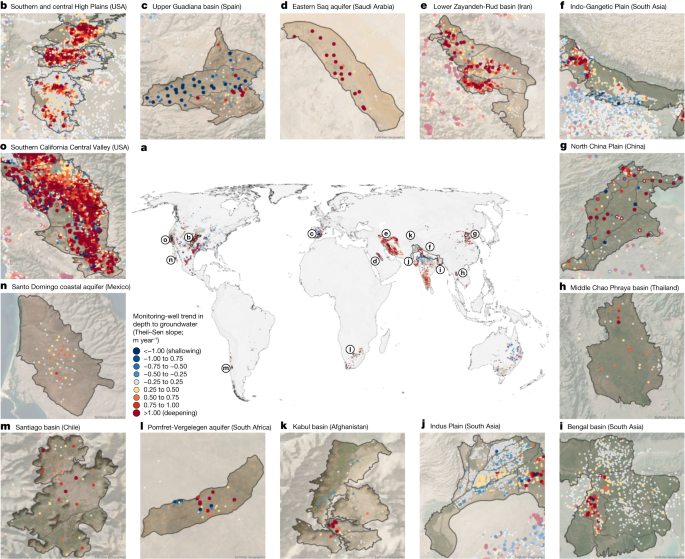2024-01-24 カリフォルニア大学サンタバーバラ校(UCSB)
◆減少は主に乾燥地域で見られ、地下水再生プロジェクトなど一部の地域では改善されています。研究者は気候変動との関連も指摘し、地下水へのアクセスリスクをより良く予測できるよう努力しています。
<関連情報>
- https://news.ucsb.edu/2024/021303/global-groundwater-depletion-accelerating-not-inevitable
- https://www.nature.com/articles/s41586-023-06879-8
世界の帯水層における地下水の急速な減少と回復の例 Rapid groundwater decline and some cases of recovery in aquifers globally
Scott Jasechko,Hansjörg Seybold,Debra Perrone,Ying Fan,Mohammad Shamsudduha,Richard G. Taylor,Othman Fallatah & James W. Kirchner
Nature Published:24 January 2024
DOI:https://doi.org/10.1038/s41586-023-06879-8

Abstract
Groundwater resources are vital to ecosystems and livelihoods. Excessive groundwater withdrawals can cause groundwater levels to decline1,2,3,4,5,6,7,8,9,10, resulting in seawater intrusion11, land subsidence12,13, streamflow depletion14,15,16 and wells running dry17. However, the global pace and prevalence of local groundwater declines are poorly constrained, because in situ groundwater levels have not been synthesized at the global scale. Here we analyse in situ groundwater-level trends for 170,000 monitoring wells and 1,693 aquifer systems in countries that encompass approximately 75% of global groundwater withdrawals18. We show that rapid groundwater-level declines (>0.5 m year−1) are widespread in the twenty-first century, especially in dry regions with extensive croplands. Critically, we also show that groundwater-level declines have accelerated over the past four decades in 30% of the world’s regional aquifers. This widespread acceleration in groundwater-level deepening highlights an urgent need for more effective measures to address groundwater depletion. Our analysis also reveals specific cases in which depletion trends have reversed following policy changes, managed aquifer recharge and surface-water diversions, demonstrating the potential for depleted aquifer systems to recover.



